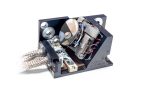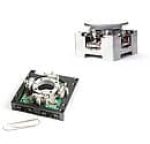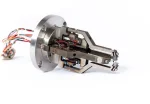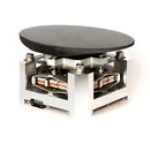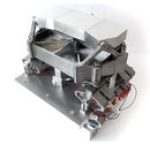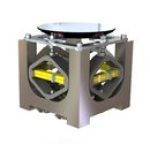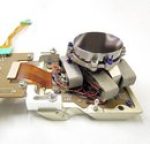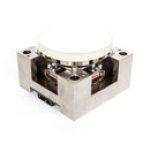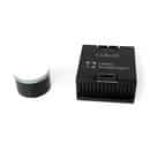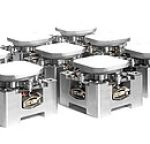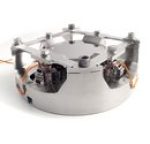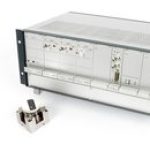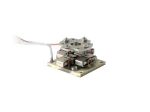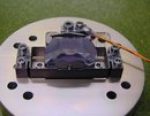Piezo Mechanisms
Piezo mechanisms are based on at least one piezo actuator and on additional functions:
- A piezoelectric mechanism can be based on only one actuator which takes care of some other degrees of freedom by guiding mechanisms. For example the Optical Phase Difference Actuator (OPDA), a space-qualified linear piezo stage developed for Oerlikon-Contraves Space into the LISA mission presented hereafter, is based on one APA®; and on an elastic guiding.
- A piezoelectric mechanism can be based on several actuators offering a complementary role. For example in CEDRAT TECHNOLOGIES’ XY piezo stages, the piezo actuators of the Y axis provide motion guidance of the X axis actuators and vice-versa.
Most of CEDRAT TECHNOLOGIES’ piezoelectric mechanisms are based on standard or customised Amplified Piezoelectric Actuators (APA®) or Parallel Pre-stress Actuators (PPAs).
They allow the realisation of X and XY stages, tip-tilts, hollow actuators, shutters and 5 or 6 degrees of freedom precision mechanisms.
CEDRAT TECHNOLOGIES’ piezo mechanisms benefit from a large aerospace heritage, which itself results from the design choices towards a high reliability and a high energy density: CEDRAT TECHNOLOGIES’ piezoelectric actuators are highly pre-stressed and do not include weak points (as hertzian pivot or flexural hinges). This provides several advantages : a very good ability to withstand external loads (as external vibrations), high dynamics (capability in a large bandwidth from Dc to above resonance) and a long life time.
CEDRAT TECHNOLOGIES’ monolithic (solid state) piezo mechanisms combine one or several actuators and guidance in one single part, as in the XY stages. This provides additional benefits in terms of compactness, cost and reliability.
The following examples show various prototypes and customised products. Other examples can be found in the mechatronic systems section and among the related publications.
Point Ahead Mechanism PAM30
The PAM30 has been developed by CTEC for the NASA’S PSYCHE mission. This high-precision device ensures that the laser beam, used for deep space communication, remains accurately aligned between Earth and the spacecraft.
Applications
Deep Space Optical Communications (DSOC), point ahead mechanism
STATUS
Space qualified prototype
MINI P-FSM35XS
This mini FSM offers a stroke of 6 mrad and a resonant frequency of 1700 Hz, with a mass of 50 gr. It is a good candidate for all projects involving nano satellites or cube satellites, and is a high end alternative to MEMS, which reliability and resistance to space conditions are still being questioned.
Applications
3U CubeSat; nano satellites
STATUS
Product
Piezo Microscanning Mechanisms
Microscanning is a key technique in high-resolution IR imaging field.Two technologies are proposed by CEDRAT TECHNOLOGIES (CTEC): moving a lens with a XY25XS Stage or tilting a mirror with a DTT15XS mechanism.
Applications
Micro-scanning, Dithering or Pixel shifting
STATUS
Product
SOLEIL BEAM SHAPER
CTEC has developed in collaboration with SOLEIL a beamshaper to adjust the beam shape. With this mechanism the shape of the X ray beam is a rectangle and can be adjusted.
Applications
Beam shaper, synchrotron
STATUS
Prototype
FAST POSITIONER FOR FILTER ARRAY
CTEC has designed and produced a fast positioner
for filter array composed by 6 APA600MML in a monolithic structure in collaboration with SOLEIL to reach hight performances and robustness.
Each arm is holding a filter and can move independently up to 3.5 mm with a high resolution.
Applications
Fast positioner, synchrotron
STATUS
Prototype
Double tip tilt DTT300ML-SG-SV
Fast steering mirror FSM for SiC large aperture mirror with its controller rack.
Applications
High power laser, line of sight stabilisation for atmospheric disturbance compensation.
STATUS
Prototype
Double tip tilt DTT120ML-PTW for MEFISTO
In the context of CNES future observation satellite and DGA funding, and in collaboration with CNES and SODERN, CTEC designed a large space mechanism.
Applications
The MEFISTO mechanism is dedicated to fillet compensation for space telescopes.
STATUS
Space qualified prototype
Double tip tilt DTT95ML-SG-SV
Fast steering mirror FSM with 120 mm diameter SiC mirror.
Applications
Space, point-ahead mechanism for infrared telescope.
STATUS
Space qualified prototype
Double tip tilt DTT60S-SG for ATLID
Thanks to the heritage from the PHARAO DTT, CTEC has developed the ATLID Beam Steering Mechanism (BSM).
Applications
Space, beam steering
STATUS
Space qualified prototype
Double tip tilt DTT40SM-SG FSM
Fast steering mirror FSM for 80 mm diameter mirror.
Applications
High power laser, atmospheric disturbance compensation.
STATUS
Prototype
Double Tip Tilt DTT35XS-SG-SV
Fast steering mirror FSM for 50 mm diameter mirror with CCBu20 controller box.
Applications
Line of sight stabilisation.
STATUS
Prototype
Double Tip Tilt DTT15XS-SG FSM
Compact fast steering mirror FSM with its controller box for embedded electro optic systems.
Applications
Image stabilisation and micro-scan combined in a single unit (5th and 6th axis of gyro stabilised platform).
STATUS
Product
Cryogenic Double tip tilt DTT10H for ESA CFSM project
For the ESA EChO mission, the use of a fine steering tip and tilt mechanism ensures the stability of the line of sight for a telescope operating in cryogenic conditions.
Applications
Space, pointing
STATUS
Prototype
Double tip tilt DTT10M-SG-SV FSM for high power laser
Fast steering mirror FSM for 50 mm diameter mirror with its controller rack.
Applications
High power Laser, atmospheric disturbance compensation.
STATUS
Space evaluated
Double Tilt Translator: DTT35XS
DTT35XS-space is a very light piezoelectric tip-tilt mechanism designed according to ECSS space rules for Pharao mission and delivered to EADS.
Applications
Instrumentation, Optics etc.
STATUS
Product
Piezo stage for optical delay line: OPDA
OPDA is an outstanding example of accurate mechanisms for instrumentation in a harsh environment. This X stage has been delivered to Oerlikon Contraves for LISA mission.
Applications
Optical Delay Line, Space mechanism, Intrumentation etc.
STATUS
Space qualified prototype


